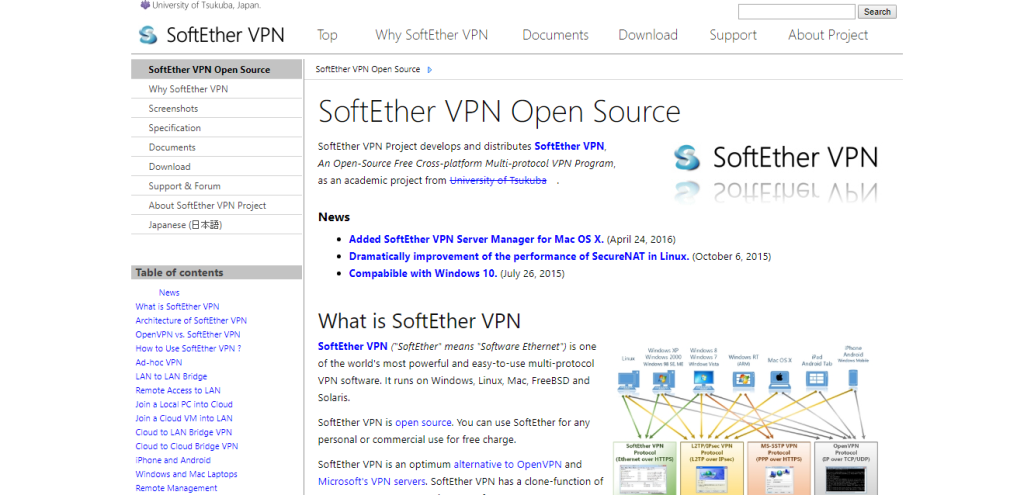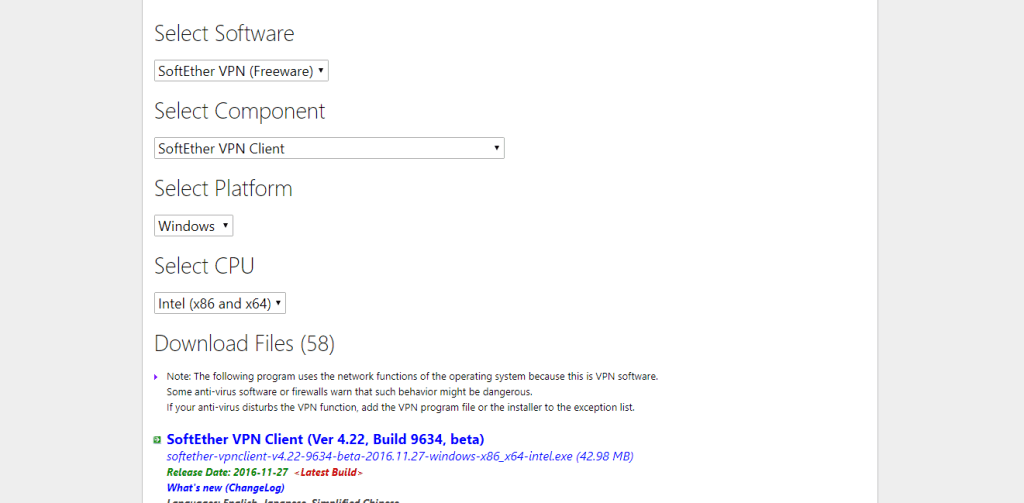There are a variety of security protocols and VPN software, with some of the most common ones being OpenVPN, L2TP, and IPsec. The most used one at this point in time is OpenVPN because it offers the best protection, speeds, and versatility. However, recent developments have given birth to a newer security software known as Softether. Softether is a security protocol that is only accepted by a few providers and is the most recent development in the technological space. This article will outline what this protocol can do, how to get your hands on it as well as some of the advantages and disadvantages associated.
What is Softether?
Softether, as already stated, is a newer security protocol developed for VPN use. The software was developed in a Japanese university. A man called Daiyuu Nobori was the head developer and finished the VPN software in 2014. Currently, this is the newest and most advanced VPN protocol that has been released and shares many similarities with OpenVPN. Especially in terms of security. Softether actually stands for software Ethernet and is beginning to be recognized as a powerful piece of software. It is free to use and is available on a wide range of operating software, including Windows, Mac, and Linux. The software puts less strain on operating systems and can support multiple security protocols, as well as its own. There are a ton of other features that Softether offers and they will be disclosed throughout the review.
How to Use softether VPN (step-by-step)
As I have stated in the previous paragraph, Softether is free, open-source software you can download anytime. All you have to do is either navigate to the main Softether website and find the download tab, or find a service provider who supports the Softether protocol and downloads it from there. To make things easier, download the software from somewhere like LimeVPN, which offers a direct download for their VPN client. If you want to go straight from the website you will need to select a few more options, which may complicate things for the novices. Side note: Make sure you have a VPN service provider that supports Softether!! They will clearly state so on their website. When you make your way to the Softether client you will need in input some server details. These won’t work if your provider doesn’t support the protocol.
Anyway, here’s the step-by-step process:
Download the Softether client
Navigate your way through the installation wizard
Agree to the terms and conditions Select a directory to install the files Let the installation run and then click finish
Once the setup is complete, open the Softether client
Click “Add VPN connection” (if you’re asked to create an adapter, click “yes”)
This is where you’ll need to input the details of your server (these will be supplied by your provider)
Click “ok” and right-click on your new connection and click “connect”
The VPN should start You will be able to add as many servers can you please depending on the provider you’re using. Just repeat steps 4-7 for each server. So now, you should know how to use softether vpn client.
What Features Does Softether Have?
When compared to other VPN security protocols, Softether has a lot to offer in terms of features. As previously stated, it is very similar to OpenVPN but has a few extra features that may make it the preferable option. In general, it has a tough encryption, is a stable protocol and can be used with a range of software. Below are a few of the features that Softether has.
Multi-Compatible
Softether is compatible with a wide range of operating systems and has been classified as BYOD, which stands for “bring your own device”. This essentially means you can apply Softether to any device you have, including your IPad, iPhone, Android and both Windows and Mac operating systems. This is because Softether allows both L2TP and IPsec to be configured, allowing for easy setup on the majority of devices. Compare this to OpenVPN and you can see why Softether becomes a preferable option.
Technically Advanced
As for the technical specs of the software, Softether runs some of the strongest and stable encryptions available for VPN. Softether supports an AES 256-bit and RSA 4096-bit encryption, providing tough security, stability and speeds. IN addition, Softether also provides a range of other features, including the ability to establish remote access to all devices and can create site-to-site VPN connections. The software also has the ability to get through firewalls fairly easy because of the SSL-VPN protocol it features. As for the others features, Softether can perform VPN over ICMP and VPN over DNS, if required.
Open Source
Just like the OpenVPN security protocol, Softether is an open-source software that can be changed by third-parties. Of course, if you don’t know what you’re doing then we suggest you leave the software’s coding alone. However, if you happen to have some experience in coding, you can go ahead and attempt to customise and improve on the current design. This allows individuals to make custom changes to suit their preferences.
Superior Speeds
One thing that has been identified with Softether is its great speeds and stable connections. Softether currently has superior speeds to any other VPN protocol, including PPTP and OpenVPN. In a nutshell, Softether has been seen to be as fast as PPTP but as secure and stable as OpenVPN, providing the perfect blend. When you compare the software directly to OpenVPN, it outperforms it enormously. OpenVPN can reach 100mbps, whereas Softether reaches 900mbps and more! If you want to stream and torrent on your VPN, Softether may be the speed you need.
An Alternative to OpenVPN
We have already mentioned the two security protocols in comparison, and there’s a reason behind it. OpenVPN and Softether are very similar because of their security, stability, and speeds. The only real differences between the two are that they were developed differently (one is a company and the other was a University project) and that OpenVPN is available on more services (because of its age). However, Softether has proven to be a great alternative if you’re looking for a protocol that has great features.
The Disadvantages of Softether
With all the great features and performance points that Softether has to offer, it may initially seem like a no-brainer to adopt this protocol over all others, including OpenVPN. However, although the security protocol is fantastic, it still has its limitations just like any software. Here are a few that are most notable.
Is Not Heavily Supported
The main issue that is faced with Softether is that it isn’t readily supported by a range of services. However, this may not be an issue in the future when these services catch up and adapt their servers to work with the protocol. The main reason they don’t tend to support Softether is because of its age. The protocol is very new and was only recently developed. As a result, many services have not yet implemented the protocol into their available protocols. With time, however, you may begin to see Softether more and more.
Not Traditional
This may seem like a trivial one but it may be a big reason for a lot of individuals. A lot of the people who use VPNs are conscious about their privacy and want to know they’re in safe hands when they’re using a VPN service. Because Softether is a new development in the security protocol space, many users may not trust it. They will feel more comfortable with their standard OpenVPN protocols than using a newer protocol that hasn’t been widely tested by the community. However, as with the service provider issue, with time, users may come to accept this new development.
Some Services that Allow for This Security Protocol
Although the number of services that support Softether is slim, there are a few services that can use the protocol to protect you when you’re surfing online. Some of the companies have been listed below and they tend to stress that Softether is the best option, especially LimeVPN.
Ivacy
Ivacy is a great VPN with locations in over 100 countries. They allow for torrenting and even offer a promotion where you get the first year for free when you purchase their yearly plan. They are also able to connect to the Softether security protocol as well as many others. You can pick up this VPN for as low as $4.08/month. They also allow for 5 logins in one instance.
CactusVPN
CatusVPN is a smaller VPN service only available in 9 countries. However, their speeds are great and they also support the Softether protocol. When you download their software they provide you with a range of other features, including a kill switch, DNS leak prevention, and easy protocol switching. You can grab this VPN easily for $4.99/month.
12 VPN
12 VPN have servers located in 14 different countries around the world and support the Softether protocol. They allow for unlimited connections from all your personal devices and are averagely priced when compared to other services. You can try out this VPN risk-free for 14 days.
VPNGate
VPNGate is the official VPN that was developed by the University for Softether. If you’re looking for a VPN that is dedicated to this protocol, VPNGate is the way forward. Even better is the fact this VPN is free, just like the protocol. The only real issue is they do not allow torrenting on their network. Its sole purpose to help with the censorship laws present in certain countries. They’re true believers of virtual freedom.
LimeVPN
LimeVPN has 25 servers around the world and has custom-built software that works with Softether, OpenVPN and a range of other security protocols. They allow you to connect 20+ devices to an account and support a range of operating systems. They’re also very cheap with their cheapest packages costing just $1.49/month.
Conclusion
Softether is the latest addition to the security protocol world and is still an ongoing academic project in the Japanese University it was founded in. The protocol is on par with OpenVPN and is better in some respects, especially when you compare them by speed. The only real issue with the protocol is that it’s not supported by a range of VPN service providers. However, in time, I believe we will be seeing this protocol a lot more often.




